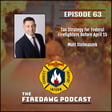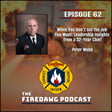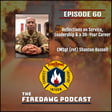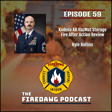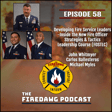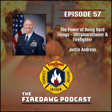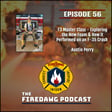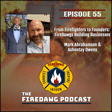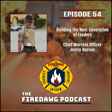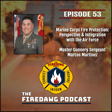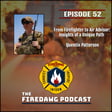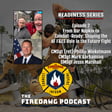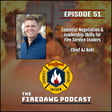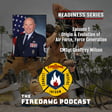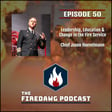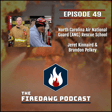Introduction to Fire Dog Podcast & Table Talk
00:00:02
Speaker
This is the Fire Dog Podcast.
00:00:14
Speaker
Welcome, my name is Matt Wilson, and thank you for listening to the Table Talk series on the Fire Dog Podcast. The Table Talk series is a free-flowing conversation between friends and peers on topics like reading, leadership, successes, failures, fire ground tactics, and much more.
00:00:27
Speaker
It's the kind of discussion you'd have around the kitchen table at your firehouse. These are conversations we have all the time, and here at the Fire Dog Podcast, we thought it'd be worth recording and sharing some of them.
Balancing Military & Fire Service Obligations
00:00:37
Speaker
In this episode, Chris and I discuss how to balance military and fire service obligations, where to put your attention throughout your career, starting with mastering your craft as a firefighter, as an airman. Before anything else, we talk about the importance of job proficiency as a foundation to leadership, how and when to build relationships across units, how to approach promotions, professional development, and how to choose extracurricular activities that matter to you and align with your growth and align with your personal goals,
00:01:05
Speaker
and also help people in the process. After you've listened, join us on our Facebook group, Fire Dog Mentorship, or visit us on social media at any of our pages to continue the conversation.
00:01:20
Speaker
So Chris and I today are going to talk about our thoughts, our perspectives on how to balance the responsibilities of a military member with the responsibilities of a firefighter. So, of course, I'm active to duty, Air Force. I understand that perspective.
00:01:38
Speaker
Chris, Air Force Reserve, also a firefighter in Indianapolis. We have competing priorities. There's things that the military want of us that we're expected to do, that we see peers that are not firefighters in the military,
00:01:54
Speaker
ecosystem doing things, how do we stay relevant in that ecosystem? But at the same time, be a good firefighter for our communities, for our Air Force bases.
00:02:08
Speaker
Be a good firefighting practitioners. That requires a lot, and some would argue, a lifetime maybe of learning and experience to really get it dialed in. So how do I compete?
00:02:20
Speaker
you know How do I deal with these two competing priorities? That's a hard question to answer. I'm not... I'm not going to sit here and tell you that I have the answer to it, but I can tell you how I approached my career.
00:02:33
Speaker
I think that it did me well. I think I was able to balance both. I'm not done with my career yet. I think I was able to balance both pretty well. um Had I not had one or the other, i could have been good at you know just that one thing. right I could focus 100% of my attention as being the best possible firefighter. But...
00:02:52
Speaker
um you know, I wasn't able to do that in this ecosystem. Right. So that's what Chris and i are going to talk about today. Any initial thoughts, Chris? I feel like this is an age old dichotomy, right? All career, my entire career, there's been, you know, yeah everybody can think of the, the high performing firefighters who are not good airmen.
00:03:17
Speaker
And we can think of high performing airmen who sure may not be good firefighters. Yep. Yep. And it's a pretty common ah you know topic of discussion or arguments of like, who should we promoting?
00:03:33
Speaker
Sure. Who do you want in the seat? Yep. So yeah, I'm looking forward to getting into this. Yeah, it is. it's It's a problem as old as time, and it's going to be a problem after after this podcast.
00:03:45
Speaker
yeah Hopefully, some nuggets we share can help people navigate the complexities of that.
Proficiency in Firefighting & Leadership
00:03:53
Speaker
So I have some notes down of things, how to approach it. So where to focus your attention, how to integrate with the military and other units within your installation, um how to approach professional and career growth, and then how do I integrate those extracurricular volunteer things that we know in the Air Force separate us when it comes to promotions.
00:04:18
Speaker
Everybody that's up for promotion, theoretically, is good. If you're at the top 10 of a promotion list, you're good in your respective careers. That's the assumption.
00:04:30
Speaker
You're a good electrician. You're a good plumber. You're good firefighter. Now, how do I separate myself as a good firefighter from the good plumber? In my experience, it's always those extracurriculars that make the difference.
00:04:45
Speaker
That's the game. That's the ecosystem we live in. A lot of people have heartache with that, and I can understand why. But it's not going to change the way things are, right? um It's kind of the way that it is.
00:05:00
Speaker
I think that some high-level restructuring would have to be done for that to change. But you know that's not we're not in a position to do that, so we have to play the game that we're hands that we're done. So the first thing I want to talk about is where do I focus my attention?
00:05:15
Speaker
I think that's, and what I mean by that is we have these two competing priorities. Which one should I focus my attention on? Well, it's dependent on what tier you are in the hierarchy. So if you're a firefighter, if company officer, an airman or an NCO, in my opinion, it's important to first be the best firefighter.
00:05:38
Speaker
You have to master the basics. You have to be you have to do the things that you're asked to do. You have to be thorough in your truck checkouts. You have to be um intentional about your training.
00:05:51
Speaker
You really have to invest in being the best. firefighter that you can be
Building Relationships for Career Growth
00:05:57
Speaker
because that's going to be foundational for everything else if you don't have that foundation like that's what the air force hired you and pays you to do is to be a firefighter for the air force for the brain corps the army whatever if you're not good at that then you don't have a solid foundation i think that you can make up for it other ways but that foundation is not going to be there And I think that that's detrimental to credibility as you climb the ranks.
00:06:21
Speaker
If you're not a good firefighter, you weren't a good firefighter, right? It's detrimental to your credibility. And then if you're asked to be a leader in a fire department, if you're promoted to the chief level, assistant chief, you know, whatever, or a station chief, you don't have an understanding of the the intricacies of a fire department. You know, you don't know what it takes to move hose through a house. You don't know how to position the apparatus outside of a two-story building. You don't know how to make room for the truck, the ladder.
00:06:53
Speaker
you know You don't know how those pieces integrate. I'm not saying you don't, but maybe you're not the best at that. So that's why I say I think it's important to first build that foundation, job proficiency. I agree. And I think that's something that that would be pretty controversial, right? If you were to survey, you know, leaders all across the military, you know, which should be prioritized ahead of the other if you've got to pick one or the other. I bet it would be split 50-50, split it down the middle.
00:07:21
Speaker
But I totally agree from a prioritize and execute perspective where in our career field, Fighting fire is going to be, you know, one of the most high risk, you know, low frequency responsibilities that you have.
00:07:40
Speaker
And you need to be proficient at the things where or lives may be on the line. Some of the Air Force stuff, um you know, maybe you're not a great EPB rider.
00:07:53
Speaker
The consequences are Way less, way less severe than, you know, not being ah confident and capable of the things you should be as ah firefighter.
00:08:06
Speaker
What an excellent point. It's easy to become complacent because those things are, like you said, low frequency. They don't happen often. They may not happen once every three to five years.
00:08:22
Speaker
I don't have to worry about that. I can focus my attention in other ways. And many people do that. But in my opinion, you're playing with fire. Like you have a responsibility.
00:08:35
Speaker
Some would argue the heaviest responsibility whatsoever. of any other career field. People expect you to solve their problems if they call 911. They don't call 911 thinking the fire department can solve their problem.
00:08:52
Speaker
They call knowing the fire department can their problem. Are you ready to meet that expectation? And only you know the answer to that.
00:09:02
Speaker
And that's a heavy responsibility. And so I think that really, yeah, that's the foundation of it is
Responsibility & Proficiency in Emergency Situations
00:09:10
Speaker
the people on base that expect you to put their fire out to save their you know to save their home or to perform CPR on their loved one or whatever the case. um And the only way that you become good at that is just continually practice understanding that complacency, it's easy for it to kick in.
00:09:31
Speaker
That's right. Every single fire dog has raised their right hand and taken an oath to one oath of enlistment and an oath to protect those who serve. Right. That, that is the most important thing of our entire mission that, that job proficiency. And I will say, I've heard a lot of people use that as an excuse for not being good at air force things.
00:09:57
Speaker
Right. They'll, they'll say, you know Maybe they're getting beaten up for their EPB writing, and they will use not trying you know they'll use that excuse for not trying to be good at the things they need to be good at on the Air Force side of things.
00:10:15
Speaker
But it's not an in and or conversation. I think we've talked about that on this podcast before, that you can be a good firefighter or a good airman. The expectation is that you're good at both.
00:10:28
Speaker
So don't use you know prioritizing firefighting as an excuse for not being good at the things you need to be good at as an airman in the United States Air Force.
00:10:39
Speaker
Yeah, I'm not a good writer. I don't have time to do it. You have to make time. um You have to try. But I think you said it earlier, prioritize and execute.
00:10:50
Speaker
Prioritize those priorities or the things that are most important. number one, being a good firefighter. And then you'll have time and opportunity to develop those other skills, those requisite things to be a good and NCO or whatever the case.
00:11:10
Speaker
I want to talk about also how do we integrate in with other organizations on the base. So that's one of the
00:11:19
Speaker
requirements in the Air Force is that I'm expected to integrate with these other squadrons and units to remain relevant, right, in this ecosystem so that I'm promotable.
00:11:32
Speaker
I think that early on in the career as a firefighter and airman, it's important, again, to focus on being a good firefighter first. As you transition to become an NCO, that's when it's time to build those cross-organizational relationships.
00:11:48
Speaker
so I think that this works on both levels. It helps you on the military and as a firefighter because when you are called to an emergency, you're often asking for plumbers or electricians to help you out.
00:12:01
Speaker
That's when it's important to start building these cross-organizational relationships. So that's going to help you functionally, and it's going to help you and those other extracurricular pursuits too. You're going to know people. it's And I don't think that this is...
00:12:17
Speaker
only an Air Force thing. This is something that exists in probably every community. like I need to know people in the community to call upon when I need help with something. so But I think that that transition happens as you after you've built a solid foundation through the first one to four years as a firefighter. you know Of course, our timeline is much shorter than than a municipal firefighter.
00:12:43
Speaker
One to four years, you build a solid foundation of learning every single day, focusing most of your attention on job proficiency, and then as you transition into a leadership role, arguably probably the hardest transition, I think, because it's the first time that you're in charge of people and not just yourself.
00:13:00
Speaker
That's when you start to build those cross-organizational relationships, again, because those people can help you solve complex problems beyond the firehouse, and it helps you with extracurricular activities.
00:13:13
Speaker
Man, I think especially in the battle space that we're preparing for. Where the future of, you know, wartime firefighting isn't plopping down at Ali Asalim Air Base with 80 firefighters, you know, doing structural firefighting.
00:13:31
Speaker
It looks very different, the whole, you know, what's ah Wink always said. Agile combat employment. Oh. Yeah. the the The two senior airmen, the staff sergeant oh okay on an island with, you know. Oh, yeah. Cold, naked and afraid or whatever. Cold, naked and afraid. Yeah.
00:13:47
Speaker
With a couple other airmen
Importance of Relationships for Promotion
00:13:50
Speaker
solving things that that we're not used to solving right that are going to take relationships, not just with the squadron, but across any wing.
00:13:59
Speaker
to to handle whatever we need to handle in that environment. That crosstalk and those relationships are going to be insanely valuable. And we'll we'll absolutely make the difference between success and failure.
00:14:16
Speaker
And again, this isn't something exclusive to the military. It's something that... outside of the military is important to this.
00:14:27
Speaker
I just, I'm going through the executive fire officer program through the national fire Academy and talking to people who have nothing to do with the military. And this is, this was a talking point.
00:14:39
Speaker
in nearly every conversation we're talking about leadership and leading yourself and leading an organization and how important having a network of people to lean on is having confidants, uh, having allies and and people that don't understand your business and you don't understand them, theirs, or, or you're in a different organization.
00:14:58
Speaker
Um, it's important no matter where you are, but as you mentioned, especially uh, a conflict with a peer adversary where we're expected to do this agile combat maneuver, go out to small places with fewer people,
00:15:14
Speaker
and a captain who's in charge and maybe a staff sergeant who's in charge. And it's you represent your function with two other people. And then there's a plumber with you an electrician with you and a carpenter with you.
00:15:27
Speaker
You know, how good is that relationship? And however good that relationship is, is going to really determine how well you guys can execute the job together and ultimately survive if we're being honest.
00:15:40
Speaker
ah Even in day-to-day operations, you know not even in a contingency environment, I feel like a blind spot in my career, something that I kind of came into later, was the realization of how powerful relations are relationships are for getting anything done. you know I had this kind of feeling early in my career that you know if you follow the process perfectly, do what you're supposed to do, that things were going to play out the way they were supposed to play out.
00:16:09
Speaker
And That's not how they work in the civilian world. It's not how they work in the military. It's it's relationships getting things done a lot of the time. It's still important to be ah proficient at whatever process or whatever you know ah system we're supposed to use to do what we're trying to do, but that relationship is so valuable.
00:16:31
Speaker
and For a lot of my career, out I've been so laser-focused on fire. I care about firefighters. And it wasn't until, you know, really kind of recently where I've i've understood the value of that cross talk across the squadron, across the wing, and how, you know, as your career progresses, your responsibility kind of progresses in that regard where you've got to have, you know, a much um wider view than maybe you do as the, you know, staff sergeant in a fire flight.
00:17:07
Speaker
Still love firefighters. That's still, you know, that's still right here in my heart. Absolutely. But that can be a tough pivot to make. And I've i've seen that in my own career. And I think it has a bad connotation. and Sometimes people say, oh, I'm not political.
00:17:22
Speaker
Right. don't think of it as being political. Think of it as helping your organization, helping the people that you're responsible for leading. Yeah, there's a political element to it, but that's life. You know, life is a game.
00:17:35
Speaker
And I don't mean that in a bad sense, but there's good choices and there's bad choices. The interactions you have with your family, you know, that's, that's a game too, right? Like you,
00:17:47
Speaker
in and those cross organizational relationships, it's, it's doing what's best for the collective, right? And then at the same time, taking care of those within your charge and under your responsibility and under under your umbrella responsibility. And ultimately what you guys collectively are doing for the mission or for the community.
00:18:07
Speaker
So I, I say that because, you know, being political or having being, having relationships kind of has a bad connotation sometimes. And it's, it's not the way to approach it. I don't think. feel like ah it's almost the same dichotomy we talked about, you know, with being in the being a good firefighter versus and a good airman, where when you advance in your career, you know, the being with your firefighters and being with the squadron or whatever it might be, that...
Leadership & Resource Allocation through Relationships
00:18:36
Speaker
Some people are going to be drawn one way or another, but you've got to be able to do both. You've got to be present in your flight. You've got be present in the squadron or in the group where decisions are being made, ah which is easier said than done.
00:18:51
Speaker
really is. that's something that I learned as I got to the executive level, let's call it, deputy fire chief, fire chief level.
00:19:01
Speaker
Your ability to have relationships is directly impacts the people in your department's potential to promote.
00:19:14
Speaker
I mean, that you have their career in your hands. And I don't, and of course they have to do what they have to do to put themselves in a good position. You know, that's largely on them. they have to build that strong foundation and do the things they're supposed to do.
00:19:26
Speaker
But when push comes to shove and we have a list of 10 people that we need to decide which four of these 10 are, are the ones we want to promote the relationships you have with other senior leaders are so important in that determination. Like you can make the difference between somebody, you know, having promotion potential or not.
00:19:50
Speaker
And so, and the same can be said about funding or getting fire trucks or getting new fire stations and, um, or if there's a problem with a response procedure and this organization doesn't like how we do business, or they want us to do a standby and that's maybe unnecessary um and that there's other ways we can manage that risk.
00:20:15
Speaker
If I went in and with a bad relationship or a bad approach, tried to be autocratic, I'm the fire chief, I'm in charge, and this is how I say we're going to do business, Um, that's going to be met with resistance and it's going to be detrimental to the firefighters downstream.
00:20:29
Speaker
Um, you know, you could be spending a lot of time out on the line when you shouldn't have to necessarily to use that example as a standby. So it's important to approach it that way, that the relationships you build, you know, they impact so much downstream that we don't even realize.
00:20:45
Speaker
Yeah. There's this massive ripple effect that I feel like is, um, easy to lose sight of. And i've I've got a good personal example for this.
00:20:58
Speaker
In maybe 2012, our fire chief at the time, ah very involved at the squadron, very, he wanted all the Air Force things done, right?
00:21:09
Speaker
We were submitting for every quarterly award, annually annual awards, we're scrubbing EPBs, all the things that, you know, that are common things to gripe about. And I'm confident that I i did, you know, ah that I was the guy that was like, we should be out, you know, pulling lines and, you know, owning ladders right now. Why are we, yeah why we got to mess with this garbage?
00:21:28
Speaker
Um, I ended up receiving an annual award that made it to, you know, I was applying at civilian fire departments, um, that made it to, um, a chief on the Indianapolis fire department's death And I think, you know, the ah the little write up that they always do for annual award winners.
00:21:51
Speaker
ah The chief has so many chiefs picks in any hiring process. And it led to me landing my dream job. And um I don't know that that chief a even knows it. He's long since retired.
00:22:03
Speaker
But when I think back to the ripple effect that came from, you know, this chief being involved in Air Force things, relationships at the squadron, all of that no doubt influenced, um you know, me receiving that award. And then this ripple effect that happened later down the line um put me in my dream job and That may or may not have happened, you know, without just little things like that, that all come back to relationships and engagement outside of, you know, the firefighting activities that we all love that led to this, you know, massive thing in my life.
00:22:43
Speaker
Yeah, that's a great example. You have to be well-rounded. And we want good firefighters. I mean, we do. And that's not what we're saying. We want great firefighters. I want the guy who knows hoes in and out, knows what nozzle he wants, knows how to search. like You want those people.
00:23:04
Speaker
but you have to be well-rounded. You can't neglect, um, the other things that are also important and not just important to you personally and getting your dream job, but important to your support. Um, it's going to affect them and impact them too.
Balancing Firefighting & Military Standards
00:23:22
Speaker
Yeah. Important to recognize, you know, we're, we're, uh, you know, really one of the largest fire departments in the world. When you look at DOD firefighting in our, um,
00:23:33
Speaker
All the, again, the systems and processes and standards where, you know, ah when people ask, you know, do you want the the firefighter that's most capable or do you want the guy with all the certifications and all the PME?
00:23:47
Speaker
Well, of course I want the guy that's most capable, but we're in a fire department with standards and requirements and we can't put that guy in the seat, right? Or whatever the the situation might be. It's got to be this guy. Yeah.
00:24:02
Speaker
And so both of those people have this responsibility to do both. The certification PME guy, you've got to be a confident and capable firefighter.
00:24:13
Speaker
If you're laser focused on firefighting, you got to be good at all this stuff too. There's no way around it. It's all order. it's It's hard to do. It is. And I'm not saying that I did it perfect.
00:24:26
Speaker
That's not what we're suggesting here. um Really talking about our experiences and in having tripped along the way like, hey, I want to be out pulling those, man. I don't want to be messing with this stuff. or leaning too hard in the direction away from the fire department and seeing the impacts of that.
00:24:43
Speaker
but it's It's a hard thing to do, but if you can start focusing on it early in your career, you're going to be that much better as you climb the ladder. And if you go outside of the military and do whatever you want to do, um it's important to be balanced in whatever you do and and to understand the ecosystem that you live in and to be balanced within it.
00:25:03
Speaker
while at the same time not neglecting yourself personally and those personal needs that you have, um you know, with your family and with whatever
Aligning Professional Growth with Personal Passions
00:25:12
Speaker
else too. So it's just a, it's really complex juggle.
00:25:18
Speaker
It really is. Talking about career growth, you talked about certifications.
00:25:25
Speaker
this question comes up a lot, you know, what, you know, so degrees, we all, I think know collectively that degrees help you, your promotion potential, um, in inside and outside of the air force or the military.
00:25:39
Speaker
So how, where should I focus my attention when it comes to professional development, but career growth? And my answer is always, Well, of course, it it depends on where your passion is.
00:25:52
Speaker
If your passion is in the fire service, you have to you really have to be introspective. You have to sit down with yourself and decide, what do I want to do? What am I passionate about?
00:26:03
Speaker
If your passion is in the fire service, then a fire service focused degree is going to be good. It's going to be beneficial to you. um You're going to want to do it and it's going be beneficial to your promotion potential.
00:26:17
Speaker
A lot of people go after leadership and organizational management kind of degrees. Those are okay too. Those are good too. Of course, if you're passionate about it, go after those things. Some people don't want to do the fire service stuff.
00:26:29
Speaker
And that's okay. just You have to understand that you're going to take a hit on your promotion potential. right Because the Air Force wants to see how your development supports the mission.
00:26:44
Speaker
The things that you're doing, how does it support the Air Force, right? Like you're working for the Air Force. The Air Force is paying you. you signed You raised your hand. You signed up to do this. How is what you're doing helping the Air Force, right?
00:26:56
Speaker
um It's okay that I saw a degree of like... It's like design, some kind of design, like computer-aided design or something like that.
00:27:07
Speaker
This was an EOD technician. And of his I'm looking at their records for promotion or for an award. And I see this this art design. Like, this is what this man was passionate about, clearly. And that's okay.
00:27:21
Speaker
But if I have another EOD tech who has an EOD focused or an organizational leadership focused, uh, focus degree focused, then that person is going to get the edge up. So you have to understand too, that you think about the needs of the air force, but at the same time, follow your passion. I know I said a lot there, but that's how you should approach specifically educational degrees.
00:27:46
Speaker
but I think about three elements when it comes to degrees and certifications. where that there's like a trifecta if you can get all three at once.
00:27:57
Speaker
And it's study something that you care about. I'd say that's one of the most important things. Something that you're good at, those may not be the same thing.
00:28:11
Speaker
You may care about something that's your that is not a strong suit for you, and you may be strong at something you don't really like to do. But if you can get both Something you care about and that you're good at.
00:28:26
Speaker
And then add in the third element of what's going to give you an ah ah ROI, a a return on investment. Whether that's in your career field as a firefighter, whether that's once you're you know done in the military and you're you're moving on to something later in life.
00:28:44
Speaker
and We did an episode with Shante Owens recently that he mentioned being a licensed therapist that he was able to pivot into in retirement and build a nonprofit, you know, using his therapy skills. Like there's a massive return on investment there.
00:29:02
Speaker
So when you combine those things, something that you're good at, that you care about, and is going to have some sort of return in your life, in your career, That's the trifecta. Yeah, it's tough to do too.
00:29:17
Speaker
Yeah. Other credentials too. There's the CIPSE credentials, so the Center for Public Safety Excellence. um Of course, all your IFSAC Pro Board certifications. Those things in many cases are requirements.
00:29:33
Speaker
um In some cases, they're not. But again, if you're trying to help out with your promotion potential, yeah, I would. but And fortunately, in the air Force, we have a career field education and training plan.
00:29:45
Speaker
so And they have a civilian education and training plan as well. um it it gives you the roadmap for what to do. So if you're wondering what direction to head and you want to head in the direction of the fire service and fire service in the air force, look to that career field education and training plan. It gives you a pyramid, you know, what should my milestones be and, you know, make a plan to to get after those things.
00:30:10
Speaker
But if it's something else that you want to do, um you know, go after that.
00:30:17
Speaker
Man, hit us with, you You mentioned you're in the National Fire Academy's executive fire officer course. That's a massive commitment. And I'm sure there was a ah lot of thought that, you know, led to that decision to you know pursue the EFO. What was kind of your your thought process there, you know, in the same vein of career development?
00:30:41
Speaker
Yeah, I have a passion for public safety. um i I love the idea of helping the public or being that person, being in the organization that the public calls on to help them in their worst moment.
00:31:00
Speaker
that That's where my passion lies. And I don't know, of course, I'm um' close to um close retirement in the Air Force, potentially. And I don't necessarily know how I want to transition what I've into the civilian sector. I don't know if I want to stay federal or go to the civilian side, but I know I want to stay in public safety. So I have this general aim.
00:31:24
Speaker
I don't know what I want to do, but I know it's public safety. And so i that's where I focused my undergraduate degree. I focused my graduate degree there, and it's the executive fireoff court fire course is just another milestone.
00:31:42
Speaker
that I know would help my promotion potential, my job potential, and something that I have a genuine interest in learning about. So it was those two things, and it was coupled with my passion for public safety that made me want to go after it. I don't know how it's going to benefit me necessarily. Well, i know that...
00:32:07
Speaker
i know that I'm going to be better equipped with like leadership principles and and things like that, because they really dive deep into like the complexities of leadership. And I really like interest that interests me too and how it relates to the fire service.
00:32:23
Speaker
So I know that it's going to make me better in that sense. I don't know how it's going to benefit me outside, but again, I have that general aim. That's why I went after Yeah. So, and you don't have to do EFO to become a fire chief in the fire. So there's several that aren't, and it's not, you know, it's not a requirement by any means, but it definitely helps that promotion potential.
00:32:44
Speaker
Um, and that's, One of the reasons that I went after it, and ah like um I love the experience so far. I just started out, I went to my first two-week in resident course, and there's assignments that you have to do ahead of going. There's assignments you have to do in between courses. There's four total in resident courses. It's a graduate program.
00:33:03
Speaker
And there's books that you have to read. Like to me, i really genuinely enjoy that stuff. And I genuinely enjoy like interacting with other people in the fire service that aren't military or aren't federal. And there's some federal, there was two other federal guys in my class.
00:33:22
Speaker
So, but I, I, I just, I love that, that collaboration and just meeting new people too. Yeah. Yeah.
00:33:31
Speaker
So that's a little bit on professional growth. How do I focus my attention there? It's a complicated question. Hopefully give you some nuggets to to point you in the right direction. It really comes down to what
Extracurriculars & Volunteering for Development
00:33:43
Speaker
you're passionate about. And if the fire service is not what you're passionate about, I encourage you to go find what it is you're passionate about or create that extra strategy.
00:33:51
Speaker
um And you could even leverage the opportunities that the Air Force gives you in getting degrees and paying for them and things like that. to help you in that pursuit.
00:34:02
Speaker
But if you're not passionate about it, you're going to, you're not going to have a good time.
00:34:08
Speaker
Which leads us into the last talking point is extracurricular and volunteer opportunities. So, and this is probably one of the most contentious I would say is how do i couple all of that?
00:34:21
Speaker
And I think we answered that kind of indirectly and that those, those relationships are important to getting things done and into your promotion potential.
00:34:33
Speaker
So i'd I'd say with extracurriculars and volunteering, it's like,
00:34:38
Speaker
I would pick quality over quantity. You see people kind of just spreading themselves thin, doing a bunch of things that, because they just want to maximize their potential, right? They want to maximize their promotion potential. If I did five things and the other guy did one thing, then I'm going to have more of a chance.
00:34:56
Speaker
But that's not necessarily the case. like it really Again, the the passion has to be there for you to do a good job. So really, you're doing a disservice to whatever you're volunteering for if you're doing five other things. right You can't commit yourself to all five of those things and give quality. So I always say do quality over quantity. Pick something that genuinely interests you.
00:35:17
Speaker
or something that's going to challenge you. I've done this in my career where I'm not so interested in doing that. That's not something that I would like to do. I've been knocking it for a while. Let me try it before I knock it. like Let me go put my money where my mouth is.
00:35:31
Speaker
I'll give you an example. like the They have the professional development organizations, like Top 3, 5, 6. five six and Those things in our Air Force ecosystem are really important to your promotion potential.
00:35:44
Speaker
and I had never... From the outside looking in, I've never saw the value in these organizations. I just kind of saw it as self-licking ice cream cones a little bit.
00:35:55
Speaker
And so from the outside, I was always knocking. I'm like, oh, this isn't this isn't really any value added. But I decided probably seven years ago, was like, well, let me give it a shot.
00:36:07
Speaker
And it's something that's going to challenge me because you're leading peers and maybe something that I can make a legitimate value impact with. And so that's what I did. i And I think that we did make some genuine impacts.
00:36:21
Speaker
I still think that those organizations could use some shaping at the highest levels of the Air Force. But that's how I approached it. And I did one thing and I put everything I had into it.
00:36:34
Speaker
Um, and that helped my promotion potential and it helped me grow as an individual. Yeah, man, I, that, the sense of
00:36:46
Speaker
purpose in any kind of extracurricular, anything, whether it's top three, whether it's a, uh, you know, an organization that you volunteer with, um,
00:36:59
Speaker
Man, there's something out there that will well um give i mean anybody a meaningful like outlet for their efforts.
00:37:12
Speaker
right so Find something that that clicks with you. And I love what you're saying that you know the top three's mission or whatever that organization might be, you know you may not like going to those meetings from the outside looking in, but they're they're doing...
00:37:29
Speaker
they're doing something worthwhile. And when you approach it as, Hey, I believe in like the worthwhileness of this, how do we make it better? How do we, you know, move the needle even just a little bit, same thing with any organization you might, uh, volunteer with, you know, like find that purpose, that thing, um, that you're making just a little bit better than you found it.
00:37:53
Speaker
And I think when you lean into it, it really speaks for itself over, and You know, maybe somebody else that, you know, volunteers at five, you know, walk for rabies, five Ks or, you know what I mean?
00:38:09
Speaker
Is that an office reference? um Yeah. It's funny. Yeah. We talk about the top three, the five, six and those things within the Air Force. Yeah.
00:38:22
Speaker
I think similar versions exist, and this is not me speaking from experience, but from having talked to people. I think it was as Mikey Ott. So he's fire chief at Tulare Fire Department in California, ah former Air Force firefighter, retired senior master sergeant.
00:38:37
Speaker
And he was talking to me about the Rotary Club. And when he was hired on, at some at some point near around when he was first hired, it was the city manager, the mayor, someone who was like, you go into the Rotary Club meeting?
00:38:52
Speaker
Like that was important to them, you know? And it's so we talk about it and we don't like it and maybe in the air force in some cases, but man, politically speaking, again, back to those organizational relations, those cross organizational relationships.
00:39:05
Speaker
Sometimes these organizations are like a good opportunity to bring the community together and like talk about the problems that you're having in your, in your function. And the air force, if I talk to,
00:39:17
Speaker
a maintainer about the issues that they're having with hot breaks maintenance issues or fire extinguisher, halon fire extinguisher. Like now that's that's a time we can collaborate on these collective problems.
00:39:28
Speaker
Um, and it's important to commanders or city managers too, at the same time. Yeah. ah I think a bit of it from a, uh, there's a, an iron sharpens iron element to it too, where generally people that are doing,
00:39:46
Speaker
extra, anything extracurricular are not interested in the minimum standard. A lot of times they're high performers with relationships or, ah aspirations, you know, whatever it might be, uh, beyond the minimum that's being asked of them. And those are the kinds of rooms I want to be in and the people so associate with.
00:40:08
Speaker
Yeah. Kind of when I think about my purpose for, There's a nonprofit, Firefighters on a Mission, that I've been involved with for, this will be the 14th year where we raise money to fight homelessness in Indianapolis.
00:40:24
Speaker
Every single year, it brings together good people to do a good thing. And that's it. that's That's the whole purpose. I want to do good things with good people.
00:40:36
Speaker
um And we accomplish that every single year through this fundraiser that we do. And I think when you kind of distill it down you know to that just simple sense of purpose for whatever you're doing in whatever organization.
00:40:53
Speaker
ah I think the the results will so speak for themselves, just in the good that you're able to do um and the ripple effect that'll happen throughout your career by being involved with organizations like that and being associated with people like that.
00:41:09
Speaker
Again, another one of those things that kind of happens below the surface, it might not be really obvious. yeah day to day, month to month, year to year. but But there are serious dividends that are paid by kind of paying it forward. And that's not why you're doing it.
00:41:27
Speaker
but that It shouldn't be. That's absolutely a yeah
00:41:32
Speaker
a truth. There's something to paying it forward, you know, anything like that. Yeah, so I think really the key point here is with extracurriculars volunteering, whatever it is, you have to have some level of passion for it to know that there's some good that could come out of it for not just you but other people.
00:41:52
Speaker
um It's going to help you, yes, with your promotion potential. um It's also going to help you develop. Again, like you said, iron sharpens iron. um But there has to be some...
00:42:07
Speaker
benefit downstream for other people too. that's So that's what I always tell people in ah in the Air Force is find that one thing, and I say one thing, and sometimes it's two, but try one thing first.
00:42:20
Speaker
Just try it, you know, and see what kind of good you can do and see how you can grow and and and approach it with a genuine sense of wanting to do something good. um and And do that. And if you don't like it, then, you know, hey, you gave it a shot and and you're probably going to grow from it in some form or fashion. And that's what happened to me personally. Like I grew from these experiences in the professional development organizations.
00:42:42
Speaker
And to be honest with you, I came out of it. And not wanting to go back into it. you know So I did have that experience where I gave it a shot. I met great people. There's other good people. These people are genuine. And like you said, they're the best of the best. That's ah not what you said, but you surround yourself with other high performers, right? And you learn like, oh, it's humbling.
00:43:06
Speaker
That's another element to this. it's It's humbling to know that, oh, there's other high performers. Like we think of ourselves as high performers. And maybe we think too highly of ourselves. in some case. So it's good to go check that with other high performers like, oh, this, this guy or girl is crushing things.
00:43:23
Speaker
Maybe I'm not as good as I think I am. Right. And that's, that's tough to the identity and tough to the ego, but you have to do that for yourself if you want the best for yourself in the long run.
00:43:35
Speaker
So it's, it's beneficial on multiple fronts. And, to to get involved in things like this, I think. So that's my thoughts. That's Chris's thoughts on extracurriculars and volunteering. There could be a lot more said on it. I think there could be a lot more said on a lot of these things.
00:43:54
Speaker
Hopefully that gives you some purchase points to, to, you know, approach your career with.
Final Advice on Career & Personal Development
00:44:00
Speaker
I think to recap, it's first important to be a good firefighter. Be good because your community expects you to be good.
00:44:12
Speaker
Don't be complacent because complacency kills. It could be detrimental to the community. It could be detrimental to firefighters that around you. um And then once you have a solid foundation of being a good firefighter, build on it through cross organizational relationships, um through your professional growth, and then through volunteering in extracurricular activities.
00:44:38
Speaker
Anything else, k Chris? Nope. That was a perfect summary. Cool. Well, thanks for joining us. We'll see you next time. Thank for listening to this episode of the Fire Dog Podcast. You can find more episodes like this on our website or wherever you listen to podcasts. We're also on social media connected with us at Facebook or on Instagram or LinkedIn at the Fire Dog Podcast. That is the Fire and DAWG Podcast. Don't forget to subscribe, like, follow to stay plugged into every new episode.
00:45:07
Speaker
We'd also appreciate it if you'd share this podcast episode with your friends and your coworkers, whether on social media or in your firehouse. This is Matt Wilson with co-host Chris Boikley. We thank you for listening to this episode of the Table Talk series.
00:45:22
Speaker
Until next time, stay safe.

